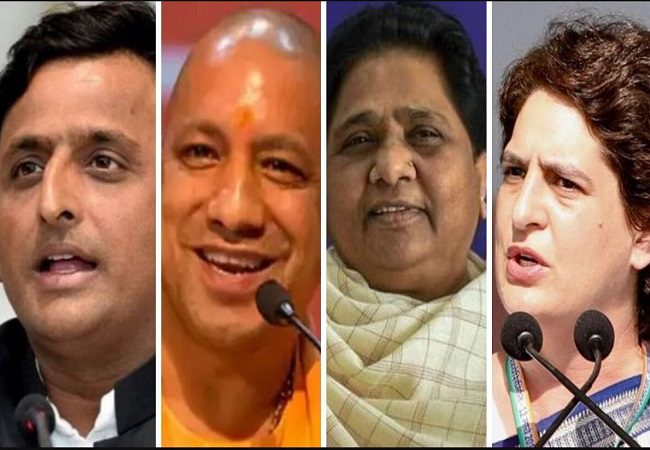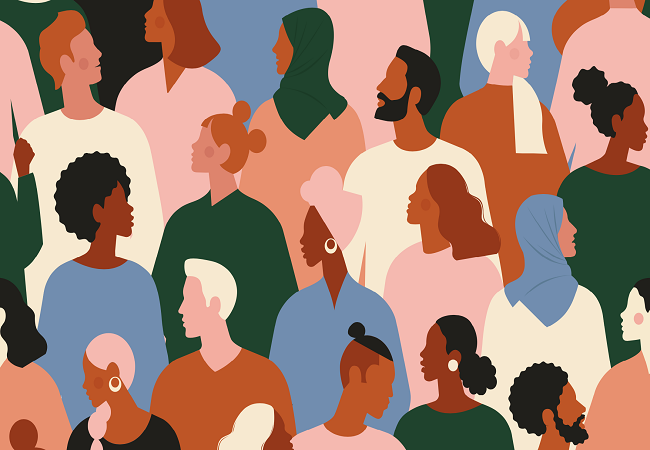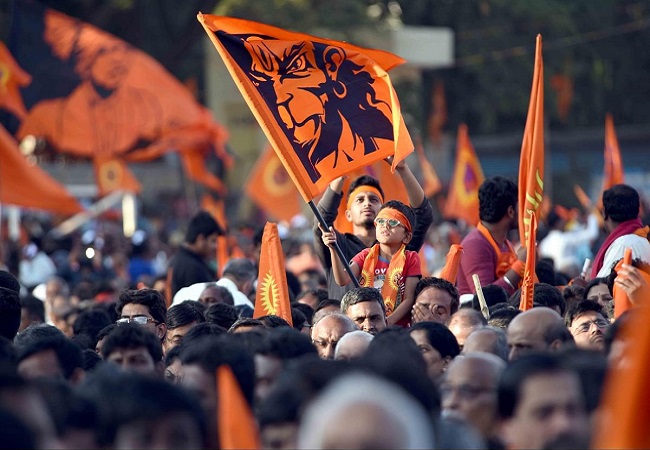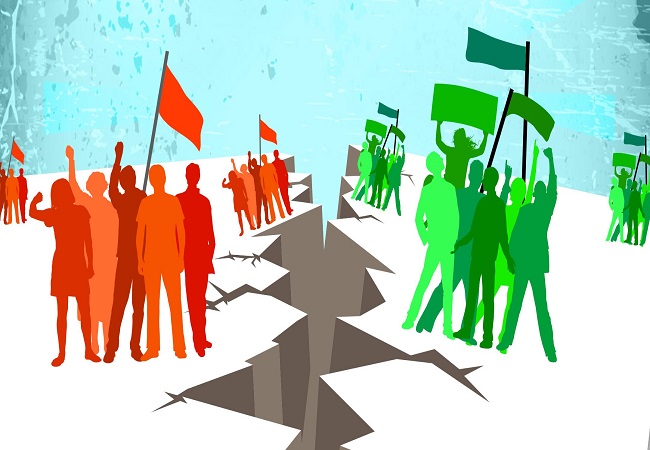
New Delhi: As assembly elections to four states come closer, the market of speculation over the victory and defeat of different parties has started gaining much ascendance. Of the four states (Uttar Pradesh, Uttarakhand, Panjab & Manipur) that will go to poll soon, a special focus is being given to Uttar Pradesh by political leaders and commentators alike. Moreover, there are very strong and valid reasons for it.
UP has a population of more than twenty crores and had it been a country, it would be the fifth most populous country in the world. It has 80 Lok Sabha constituencies and, with 403 Vidhan Sabha seats, the UP legislative assembly is the largest in India.
The state is currently governed by the BJP under the leadership of CM Yogi Adityanath who is seeking a return to power. The principal challengers to it are the Samajwadi Party (SP), led by former CM Akhilesh Yadav, and the Bahujan Samaj Party (BSP), commanded by another former CP of UP, Mayawati.

Other parties, including Congress too, are in the fray. Apart from its political, geographical, and demographical relevance, another reason why elections of UP are discussed with great interest by intellectuals on the left side of the ideological spectrum is because of their belief in the dawn of ‘identity politics’ as well as their simultaneous contempt of the ‘new identity politics’ of Uttar Pradesh. Let me explain it.
Identity politics 2.0
What is an identity? In layman’s terms, it is an individual’s reflection about himself vis-à-vis others. Mind you, that ‘other’ maybe its family, peer group, society, caste, religion, or a nation. Identities are dynamic and both converging as well as diverging. So one can have multiple identities simultaneously, e.g. a man, an OBC, a Hindu, a doctor, and Indian etc. What identity an individual would consider supreme is contextual and dynamic. It is this dynamism of identity that the leftist intellectuals hold utter disregard for.
A cursory look at the newspapers would indicate the most sellable narrative in this election season, which is about- identity politics. Newspapers are all flooded with writings of the leftist scholars about how the ‘identity politics’, which was the most dominant narrative in the state politics of UP till 2012, suffered major setbacks in the elections of 2014, 2017 & 2019. The setback was due to the BJP’s incredible victory in LS (2014, 2019) and state assembly (2017) elections. According to them, that identity politics, however, is now back in UP with even more buoyancy in 2022.

The reason for this comeback- the sudden realization by some OBC BJP leaders of the perceived discrimination of SCs, STs, and OBCs by the BJP government of UP under CM Yogi Adityanath and their leaving of the party with such unaddressed complaints and thereby joining the SP, a party of ‘backward classes’.
Nevertheless, these assertions are, conveniently stated without even once acknowledging that even in the earlier mentioned elections, identity politics was very much at work. However, this identity politics transcended the confines of caste, region, and religion but embraced the Indian civilization and took the shape of a movement, by the name of ‘Hindutva’.
The identity of Hindutva was ultimately utilized by the BJP to win the elections which gave the party historic victories one after the other. The Hindutva of the BJP, under PM Modi, had element of both traditional as well as modernity. While it acknowledged the greatness of Hindu civilization, it also included the politics of representation.

Thus, efforts to redevelop Hindu sacred places took place along with having a minister from the largest minority community, the Muslims, in both Centre and State, despite not having even one MP or MLA from the community. All the numerically small communities among the OBCs and SCs. that were not given a share of power under the previous regimes of SP and BSP were finally given their dues in Government of UP under Yogi Adityanath. Benefits of numerous welfare schemes like free ration, pucca houses, free toilets etc. were provided to all beneficiaries without any favour or discrimination.
That these intellectuals love the caste-based identity politics but abhor ‘a culture based identity politics’ exposes their commitment towards identity politics. Hindutva as an identity triumph as well as accommodates caste and religion. One can assert his backward caste or Dalit identity credentials and still be a follower of Hindutva, something that the rise of so many OBC and SC leaders within the BJP fold has vindicated.
Even Muslims joining the BJP and voting for the party (although not in large number) shows that two identities may be converging and not necessarily conflicting in nature. On the one hand they complaint about BJP seeking votes in the name of Hindutva identity, on the other hand, these intellectuals want the minorities to carry their religion on their sleeves, especially while voting in the elections. Identity politics is all about the perception of an individual with respect to the larger community. It cannot be oversimplified into ‘your identity politics’ Vs ‘my identity politics’.

Some OBC leaders have certainly left the party, but several other OBC & SC leaders have joined the party too. In fact, two small pre-dominantly OBC parties – Apna Dal (S) and NISHAD party have sealed an alliance with the BJP in the state. Had there been a ‘strong resentment’ in UP among the OBCs against the BJP government, as is being uttered by the intellectuals, these two parties would have certainly left the bandwagon and moved towards greener pastures.
The core vote bank and the majority of the cadre of these two parties are OBCs and they would have never compromised with their USP had there been a real disenchantment of OBCs with the BJP. As far as OBC empowerment is concerned, it was the Modi government that provided constitutional status to the National Commission for Backward Classes (NCBC) via 102nd Constitution Amendment Act, 2018. NCBC now has the authority to examine complaints and welfare measures regarding socially and educationally backward classes. Previously NCBC was a statutory body under the Ministry of Social Justice and Empowerment.
Permanent vs temporary majority
The opposition of the BJP has been using a new stick to beat it metaphorically through the theory of ‘Permanent vs temporary majority’. They argue that in a substantive democracy, the sheer numeric strength of the group cannot claim to become a permanent majority. The permanent majority must be dynamic and must not be against numeric minorities (read religious minorities). This logic too is irrational as the majority is, in fact, never permanent.

Many Hindus and Muslims have voted for the BJP and many have not. Similarly, many would vote for the BJP and many would not. These intellectuals want the minority to vote as a block against the BJP, thereby creating a ‘permanent yet consolidated minority’.
Results of the elections will ultimately depend on the voter’s choice and any assertion, till then, would fall in the category of assumption. Development, growth, and welfare will have an important role in the polling of votes, apart from identity politics. Indian voters have always proved themselves smarter than the political pundits and they would continue to do so this time too. Let us wait for the tenth of March to gauge the mood of the nation.
The writer is a Phd candidate at the School of International Relations (SIS), JNU, New Delhi.




